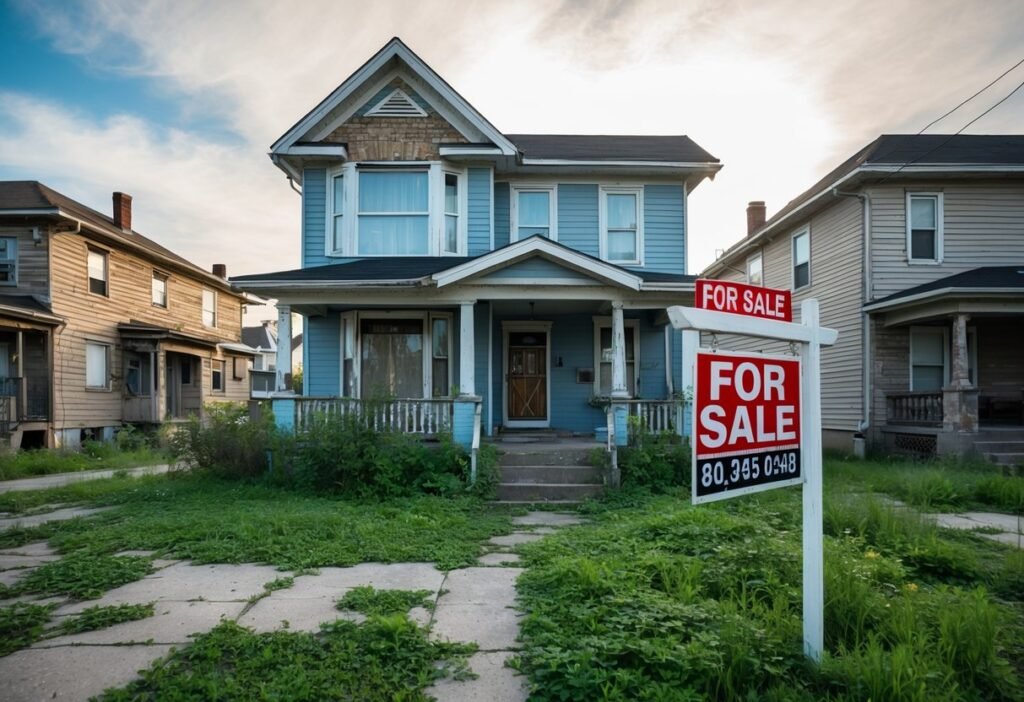Thinking about jumping into real estate? Foreclosure investing opens up a path to buy properties below market value, which could mean strong returns and some creative ways to build wealth.
If you’re new to the process, learning how to invest in foreclosures can give you access to deals that aren’t available on the traditional market.
You don’t need to be an expert to take your first steps. With the right approach, you can spot solid foreclosure opportunities, do your research, and move forward with confidence.
By understanding the basics of investing in foreclosed homes, you give yourself a better shot at making smarter decisions and dodging unpleasant surprises.
Key Takeaways
- Learn how foreclosure investing works for new investors.
- Discover steps and strategies for successful purchases.
- Avoid common mistakes that impact beginners.
Understanding Foreclosure Investing
Foreclosure investing sits in its own corner of real estate. Here, you buy properties in different stages of foreclosure.
To do well, you’ll need to really understand how foreclosures work, who’s involved, and what risks or opportunities pop up with these deals.
What Is Foreclosure?
Foreclosure starts as a legal process when a homeowner stops making mortgage payments. Eventually, the lender steps in and takes possession of the property to recover their money.
People call these homes “foreclosed homes.” They’re often listed below market value, which attracts investors hunting for bargains.
But here’s the thing: these houses might come with liens or need a ton of repairs. Buying a foreclosed home isn’t always quick or simple, either.
Everyone involved has to stick to strict legal and financial steps, thanks to local and federal rules.
It’s worth knowing the difference between pre-foreclosure, auction, and bank-owned properties. In pre-foreclosure, the borrower still owns the place, but at auction or after repossession, the lender takes over.
Each stage brings its own set of opportunities and challenges for anyone investing in foreclosures.
Foreclosure Process Explained
The whole thing usually kicks off after someone misses a few mortgage payments. Most lenders wait until the homeowner is over 90 days behind before starting formal proceedings.
At that point, the lender issues a notice of default, which puts the home into pre-foreclosure. The homeowner can still avoid foreclosure by catching up on payments or selling the place.
If nothing gets resolved, the property heads to a public auction. Bidders can buy the property, but they usually have to pay in cash and take on any existing liens.
If nobody buys the house at auction, it turns into a real estate owned (REO) property and the lender takes full possession.
Each stage of the foreclosure process opens up different investment strategies and risk levels. If you need a walkthrough, check out the complete guide to foreclosure investing.
Key Players in Foreclosure Deals
Several people and organizations play a role in each stage of foreclosure. Lenders—usually banks or mortgage companies—kick off and manage the legal side of things.
They also set auction terms and handle REO properties that end up back in their hands. Homeowners are right in the thick of it during pre-foreclosure.
Some owners try to negotiate, refinance, or sell quickly to avoid credit damage. As an investor, you might deal directly with them or through their agents.
Real estate agents and attorneys help with paperwork, negotiations, and making sure everything’s legal. At auctions, county officials run the show, and title companies help clear up liens so you get a clean title.
Knowing who does what can help you avoid headaches and move deals along smoothly.
Types of Foreclosure Opportunities
Foreclosure investing isn’t one-size-fits-all. There are different entry points, and each comes with its own buying process and level of risk.
Understanding your options helps you pick the path that matches your budget, style, and comfort zone.
Pre-Foreclosure Properties
Pre-foreclosure properties are homes in the early stages of foreclosure. The owner’s missed a few payments, and the lender has sent a notice of default, but the house hasn’t hit the auction block yet.
You can reach out to homeowners at this stage. They’re often motivated to sell and avoid foreclosure, which opens the door for negotiation and a good price.
You might also help the owner dodge a big credit hit. Due diligence is key here—check the property’s condition, look for liens, and brace yourself for negotiations that can get a little emotional or complicated.
Pre-foreclosures sometimes need a quick close, so lining up your financing ahead of time is just smart.
Foreclosure Auctions
Foreclosure auctions are public events where lender-repossessed properties go to the highest bidder. These auctions usually happen at county courthouses or online.
If you win, you often need to pay in cash or certified funds right away or within a day or two. You might get a property below market value, but there’s a catch—often, you can’t inspect the place first.
You could inherit liens or back taxes, so always research the title and auction terms before bidding. Auctions move fast, so experience and quick decision-making really matter here.
REO (Real Estate Owned) Properties
REO properties are homes that didn’t sell at auction, so the lender (usually a bank) ends up owning them. You’ll find these listed for sale with real estate agents or on bank sites.
Most REOs are vacant, and you can usually walk through before buying. Lenders might clear some liens, but they rarely fix anything.
The process feels more like a regular real estate deal, with a structured closing. Lenders might even negotiate or offer financing if the property’s been sitting for a while.
You’ve still got to do your homework, but for first-timers, REOs can be a little less risky than auctions. If you want to dig deeper, this REO investing guide covers it well.
Short Sales
A short sale happens when a homeowner sells for less than what they owe on the mortgage, but the lender agrees to take the loss. It lets the lender avoid the hassle and cost of a full foreclosure.
You’ll find short sales can offer good prices and less competition than auctions. But, the process is slower, since you need lender approval—sometimes from more than one lender.
It’s not rare for short sales to drag on for months. Patience helps, and you might have to submit a detailed offer package or cover repairs to bring the place up to market standards.
Always check for liens or debts before moving ahead. If you want more info, check out this detailed beginner’s guide.
Steps to Investing in Foreclosures
Knowing how to approach foreclosure investing can help you steer clear of common mistakes. Each step needs careful planning and an eye for detail, especially if you want to snag a property at a discount and turn a profit.
Researching Local Foreclosure Markets
Start by digging into your local foreclosure market. Look for trends and neighborhoods with a lot of foreclosure activity.
Public records and county websites are goldmines for up-to-date foreclosure listings. Notice which neighborhoods keep coming up—those might be good places to focus your search.
Check out recent foreclosure sales to see what prices homes are actually getting. If you’re not ready to buy, just attend a few auctions to get a feel for how they work.
That kind of hands-on experience is priceless before you actually invest. Networking helps, too—talk to real estate agents and local investors who know the foreclosure scene.
They can warn you about common pitfalls and point you toward neighborhoods with solid resale potential. For a deeper dive, the complete guide to foreclosure investing is worth a look.
Finding Investment Opportunities
To find good foreclosure opportunities, cast a wide net. Check public records, real estate listings, and online foreclosure databases.
These sources help you spot properties in pre-foreclosure, auction, or bank-owned stages. Some new investors buy lists of homeowners in foreclosure from county offices or specialty services.
Want more ideas? The tips for finding foreclosure investment opportunities are a solid resource.
Joining investment groups or going to real estate meetups can also open doors to off-market deals. And honestly, just keeping a simple spreadsheet of leads helps you compare options without losing your mind.
Evaluating Market Value and Property Potential
Before you buy, you have to know what the property’s really worth. Start by pulling comps—comparable sales—from the area to see what similar homes are selling for right now.
Take a good look at the property’s physical condition. Most foreclosure homes sell “as-is,” so you need to budget for repairs. Make a quick checklist—roof, foundation, plumbing, major systems—to estimate what you’ll spend on fixes.
Run the numbers: purchase price, renovation costs, and what you think you can sell or rent the place for. Ask yourself if the profit margin is really there, given local demand and vacancy rates.
This kind of honest evaluation can help you avoid overpaying and boost your chances of a win.
Due Diligence Before Purchase
Before you buy, make sure you’ve checked ownership, found any outstanding debts, and really understand the property’s condition. Skipping these steps? That’s just asking for trouble—unexpected costs and legal headaches can sneak up fast.
Title Report and Liens
Kick off your due diligence by getting a title report from a reputable title company. This document lays out whether the property is free from legal disputes and lists all recorded liens—like mortgages, unpaid tax bills, or homeowner association fees.
Zero in on any junior liens or second mortgages that might stick around after the sale. Only invest in properties with a clear title—make sure the foreclosure wipes out all other financial claims.
Ask for a detailed breakdown of outstanding liens or encumbrances. If you skip this, you could end up inheriting someone else’s debt, which makes future sales or refinancing a real headache.
Here’s a table to help track the essentials:
| Item | What to Check | Notes |
|---|---|---|
| Title report | Free from legal disputes | Provided by title company |
| Liens | Mortgages, taxes, HOA, others | Satisfied after sale? |
| Judgments | Court-awarded claims | May affect ownership |
Inspecting Foreclosed Properties
Most foreclosures are sold as-is, so a thorough home inspection is absolutely crucial before you commit. Hire a certified inspector to check the roof, structure, electrical, plumbing, HVAC, and any potential safety issues.
Keep your eyes peeled for water intrusion, pest infestations, or vandalism—these problems pop up a lot in vacant homes. Document every repair need and get cost estimates.
Try to attend open houses or arrange for a walkthrough. If you can’t get inside, talk to neighbors or local agents for intel. Honestly, skipping this step just sets you up for expensive surprises later.
Reviewing Mortgage and Tax Obligations
Mortgage and property tax responsibilities can stick around after foreclosure if the process doesn’t clear them. Check all recorded mortgages—figure out if you’re dealing with a first or second mortgage, since only the senior mortgage foreclosure wipes out junior claims.
Look for unpaid property taxes or city code violations. These usually become your problem once you buy. Call the county tax office or dig through public records to verify.
Make a checklist of all mortgage payments, outstanding property taxes, and recurring fees before you bid. Factor these into your investment math, and if you need a hand, check out this due diligence checklist for investors.
Bidding and Buying Strategies
Knowing how to approach auctions, place solid bids, and work with lenders can really boost your odds of landing a worthwhile foreclosure. Every step has its own risks and quirks, so stay sharp and avoid the common traps.
Understanding the Auction Process
Foreclosure properties usually hit public auctions, often at courthouses. Depending on your state, this might be called a “power of sale” or “trustee sale.”
You’ll need to register as a bidder and show proof of funds—usually a cashier’s check or some other certified payment. Auctions move fast and are final. If you win, you typically pay the full amount or a big deposit right away, with the rest due in a few days.
You probably won’t get to inspect the property beforehand, and you buy it as-is—liens, back taxes, and all. Some auctions are in person, others are online. If you’re new, it’s smart to watch a few before jumping in. Curious about the basics? Here’s a guide to buying foreclosure properties.
Successful Bidding Tips
Set a budget and don’t budge; emotional bidding is a real wallet-buster. Research property values, liens, and local market vibes before auction day.
Always include repair costs and unpaid taxes in your max price. Arrive early to confirm payment types and double-check auction rules.
If you can, do a drive-by to check out the property and neighborhood. Bring a list of properties and your top bids for each. Watch the pace—sometimes prices jump fast.
Stay calm and don’t get sucked into bidding wars. If you win, pay up fast. If you’re just starting out, watch a real estate foreclosure auction first—these steps for beginners in foreclosure investing can help you get your bearings.
Negotiating with Lenders and Banks
Not every foreclosure ends at auction. Sometimes, properties that don’t sell end up as real estate owned (REO) homes, and you can negotiate directly with the bank or lender.
Banks might offer inspections, allow for mortgage financing, and sometimes clear up outstanding liens. Negotiations can include price cuts, repairs, or closing cost credits.
Show solid proof of funds or a pre-approval letter to make your offer stand out. Banks often move slowly and want clean, straightforward deals. Having your paperwork ready helps a lot.
Spotting contract and title red flags is a must. Want to dig deeper? Check out these resources on bidding to buy foreclosures.
Avoiding Common Pitfalls in Foreclosure Investing
Diving into foreclosure investing can look like a quick win, but it gets expensive fast if you’re not careful. Even small mistakes can drain your wallet or land you in legal trouble.
Mistakes New Investors Make
New investors often underestimate repair costs and overestimate what a property’s really worth. It’s easy to get fooled by a decent exterior and overlook hidden damage, unpaid taxes, or code violations.
Skipping research on the neighborhood or market can kill a deal. A property might look great on paper but turn into a dud if rents are low or vacancies are high. Always run a thorough analysis and use a checklist so you don’t miss anything important.
Common errors include:
- Not budgeting for repairs and holding costs
- Skipping property inspections
- Ignoring liens or legal encumbrances
- Relying only on auction listings without real due diligence
Want to avoid these headaches? Check out Foreclosure Investing for Dummies or read 11 Mistakes To Avoid When Buying a Foreclosure.
Legal and Financial Risks
Foreclosure investing comes with plenty of legal and financial risks. You could accidentally buy a property with a messy title, unpaid mortgages, or sneaky unrecorded liens—and those debts stick to you.
If you don’t know your state’s foreclosure process, you could misstep during bidding, overpay, or even lose your deposit. Contract terms can get tricky, and missing key details can lock you into a bad investment.
Always talk to a real estate attorney before you close. Review public records and confirm the title is clean. Double-check that all debts—like back taxes or old utility bills—are out in the open before you put money down.
For more on these risks, The Complete Guide to Investing in Foreclosures has some solid strategies for spotting legal traps. Staying proactive and getting professional advice can save you a ton of grief.
Frequently Asked Questions
Foreclosure investing has its own quirks, legal hoops, and challenges. If you want to avoid costly mistakes, you’ll want to understand the sales process, strategies, risk factors, and how to size up a property—especially if it’s your first time.
How do foreclosure sales work and what should I expect during the process?
Foreclosure sales happen at public auctions or through direct bank sales after repossession. At auction, you’ll probably need to pay in full with cash or a cashier’s check, and you’ll need to move fast since homes are sold “as-is.”
Expect limited chances to inspect homes before bidding. The process is quick, with little wiggle room on payments or paperwork. For more, check out this FAQ on the foreclosure process.
What are some strategies for buying foreclosed homes as a beginner?
Start by picking neighborhoods you know well. Build relationships with local agents who deal with distressed properties.
Look for listings on the MLS, at auctions, or on bank sites. If you’re new, stick to homes needing only minor repairs and steer clear of legal messes or occupancy issues. This guide to investing in foreclosures has more ideas.
What are the risks and benefits of investing in foreclosure properties?
Foreclosed homes can be priced below market and may offer solid returns after repairs. Sometimes there’s less competition, too.
But risks include hidden repair costs, confusing title histories, and not being able to inspect before you buy. Legal snags or evictions can delay you from taking over. Here’s more on foreclosure investing risks and benefits.
How can you accurately research and assess the value of a foreclosure property before purchasing?
Compare recent sales of similar homes nearby. Check public records for liens, tax problems, or unresolved legal issues tied to the property.
If you can, visit the property or send a pro to look for structural issues. Local agents and property data tools can give you a sharper market picture.
What are the key steps in buying a bank-owned foreclosure property?
Start by getting pre-approved for financing. It’s smart to work with an agent who actually knows the ins and outs of foreclosure sales.
You’ll need to submit offers through the bank’s listing agent, and yes, they have their own set of procedures and paperwork. Next up, order a title search and get an inspection done—don’t skip those.
Make sure you budget for any repairs or renovations, since these places can definitely come with surprises.
As a first time home buyer, what should I know before considering a foreclosure?
Foreclosure homes usually come “as-is.” You might run into unexpected repair or renovation costs that you wouldn’t see with a regular house purchase.
Financing can get tricky, and there’s often more paperwork or weirdly unpredictable timelines. If you dive in, try to find a real estate pro who actually knows their way around foreclosures.
Honestly, brace yourself for surprises or delays. That’s just part of the deal with these kinds of properties.
Want to know what properties banks are about to list?
Learn how to find deeply discounted properties. Get instant access to pre-foreclosures, REOs, and short sales updated daily!

Are you a contrarian investor with the foresight to spot opportunities where others see only chaos?
Rental Property Management in a Market Crash is your essential guide to navigating turbulent economic waters. Learn how to capitalize on market downturns that inevitably occur, drawing parallels between the Global Financial Crisis of 2007-09 and current market conditions.
This book offers invaluable insights into the dynamics of the housing market during a downturn, equipping you with the knowledge to make informed decisions and build a resilient investment portfolio.
Don’t just weather the storm – learn to thrive in it. Get your copy now from your favorite bookseller:
- Amazon as an ebook
- Books2Read for Apple, Barnes & Noble, Kobo, Scribed, and 8 more sellers with both eBook and paperback options available
- Payhip as a downloadable PDF





